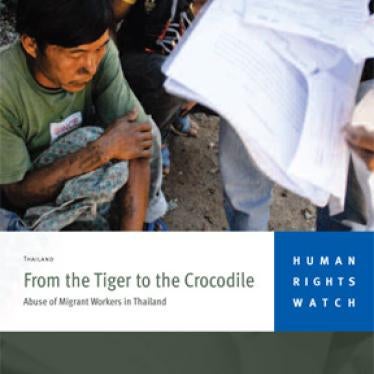Amid concerns that a Feb. 28 deadline for Thailand's Nationality Verification process could lead to mass deportations of Burmese and other migrant workers, Human Rights Watch (HRW) has released a new report looking at the plight of migrant workers in Thailand. Simon Roughneen talks with Sunai Phasuk, the senior researcher for HRW in Thailand.
Question: The new Human Rights
Watch report "From the Tiger to the Crocodile: Abuse of Migrant Workers
in Thailand," comes out as a Feb. 28 deadline for migrant workers to
enter into a Nationality Verification process looms. How will NV as
currently envisaged impact on the conditions faced by migrant workers in
Thailand?
Answer: The issue that concerns Human
Rights Watch most about nationality verification is the explicit threat
by Thai policy-makers, which was issued again by the Minister of Labor
at the ILO-Japan seminar in Bangkok on Feb. 23, to arrest and deport all
migrant workers who do not apply to enter nationality verification by
Feb. 28. Our research found that both officials and private Thai
citizens abuse the rights of migrants with impunity. This was happening
before migrants ever were told about "nationality verification," and, in
fact, these abuses appear to be continuous and systematic wherever
there are significant groups of migrant workers present. But our concern
is that the nationality verification deadline, and likely crackdowns
that will follow after the deadline passes, give police and other
officials yet another convenient excuse to commit human rights abuses
against migrants on a wide scale. The police already know that the
deadline is coming. Unless this deadline is postponed, or better yet,
revoked altogether, the crackdown will occur as a matter of course,
since our research shows that arresting and extorting migrants is a
profitable enterprise for local officials. .
Q: There are contradictory
statements coming from different Thai ministries and agencies regarding
NV. Do you think this reflects a lack of coherence in Thai policy making
with regard to NV, or just a result of turf wars between the different
entities?
A:
For a long time, too few people have paid attention to the problems with
nationality verification. It was clear three to six months ago that it
was going to be difficult, if not impossible, to get all the migrants to
register for nationality verification. Now that the deadline is coming
up fast, the various government ministries are scrambling to come up
with a response. But while it looks like a lack of coherence in
policy-making, there is a cabinet resolution on the Feb. 28 deadline.
That makes it a shared responsibility of the entire government to listen
and respond to the concerns raise by HRW and other rights groups
regarding the NV issues, and to take immediate steps to end the threat
of mass deportation and curtail any abuses that might come up after the
Feb. 28 deadline.
Q:
The report includes numerous case studies of human rights abuses
against migrant workers. Is there a sense among some elements of the
Thai security forces and among some officials that migrant workers are
an easy target to be extorted and intimidated with impunity? How can
this be changed, and the abuses you outline in the report be prevented?
A: Precisely, a number of the Thai
security forces, particularly the police, have recognized that targeting
migrant workers is both lucrative and relatively risk-free. This is why
HRW is calling for the establishment of an independent, impartial and
powerful commission to receive complaints, compel evidence and require
witness testimony, and make recommendations for prosecutions to bring to
justice those who are abusing migrant workers and their families. Let's
be clear that until some of these officials believe they face a risk of
discovery and prosecution for their abuses against migrants, it will be
difficult to change the way migrants are treated. The impunity must
end, it is as simple as that-and any police measure that contributes to
that goal can be considered a sign of progress. We also are calling for
the establishment of an ombudsman based in Bangkok who can receive
complaints from migrant workers who are too terrified to report these
grievances to local authorities who are either the abusers in the first
place, or in cahoots with the abusers. We also believe that if
permitted, the migrant workers can defend themselves-which is why we are
calling to amend the Labor Relations Act of 1975 to give full rights to
migrant workers to form labor unions (not just join them as an ordinary
member) and to serve as the elected leaders of a union.
Q: The UN human rights expert on
migrants, Jorge A. Bustamante, has said that Thailand could be in breach
of its international human rights obligations, if it goes ahead with NV
in its current form. Can you detail how NV as currently constituted
would put Thailand in breach of these obligations?
A: Well, it would be good for The
Irrawaddy to contact the special rapporteur directly on this. I am
sure that he will give an answer since what is happening in Thailand is a
major matter in the world of migrant rights. Thailand is supposed to be
a progressive leader with a respectful, pro-human rights position-yet
the policy on migrant workers raises concerns about that image.
As
I mentioned earlier, what concerns HRW is the human rights violations
that we documented as occurring regularly to migrant workers, and the
fact that often no one is held accountable for these abuses. Therefore,
your question misses the point-it is not "NV as currently constituted"
that will breach obligations, but rather, what the implementation of
nationality verification will mean if done as currently planned. Right
now, it looks like as many as 600,000 to 800,000 currently registered
migrant workers (mostly Burmese) will not apply for the nationality
verification before the end of the month. What will happen then? We
believe that come March 1, there will be a crack-down on unregistered
and undocumented migrants, and this will exacerbate the human rights
problems faced by migrants and their families.
Q: Asean recently launched a new
human rights commission, a high-profile media event as part of the Asean
summit held in Hua Hin last October. What should that Asean commission
do to improve the situation for migrant workers in Thailand?
A: The HRW report makes a specific
recommendation for AICHR, so I am glad you asked this question. Few
people have paid attention to the role of Asean in these matters, but I
think that opinions in Asean matter to the Thai government and so we
should encourage Asean to speak out on these matters. For AICHR, we urge
them to play a leadership role in engaging with Thailand to better
protect migrant worker rights and encourage Thailand to live up to its
responsibilities as a signatory to the Asean Declaration on the
Protection and Promotion of the Rights of Migrant Workers. While AICHR
does not have as strong a mandate as Human Rights Watch would like
regarding human rights protection, we do urge AICHR to use its authority
under its terms of reference to conduct a study and request information
from Thailand and other Asean states about abuses of migrant worker
rights. We also hope that AICHR will speak out on migrant worker issues
and remind countries like Thailand, Burma, Cambodia and Laos that in
regulating migration, they need to keep the issue of human rights as a
paramount concern.
Q:
Is Thai policy toward migrant workers contradictory and
self-defeating, given that the Thai economy and Thai businesses depend
on migrant labor, a vital asset given the tough time endured by the Thai
economy since the global downturn hit after September 2008?
A: There is no doubt that the Thai
economy is dependent on migrant labor in a number of key economic
sectors. A report by the ILO in 2007 estimated that as much as 6.2
percent of Thailand's GDP was attributable to the work of migrants. If
Thai businesses feel that nationality verification is going to damage
their interests, they need to speak out and make sure the Thai
government hears their voice. But employers also need to realize that
they cannot violate migrant workers' human rights with their schemes to
maintain absolute control over the workers.
Q: NV affects all migrant workers in
Thailand. However, given that the majority of these people are Burmese,
NV affects Burmese migrants on a greater scale. Does NV affect Burmese
migrants in a different qualitative way to say migrants from Laos or
Cambodia in Thailand?
A: The
difference is that Burmese must go back to Burma to undergo nationality
verification. This is because the SPDC military government of Burma is
so hard-headed and control-crazy. A big problem is that the migrants
don't trust the SPDC government. They have a good reason for this,
because the SPDC is one of the most dictatorial, human rights abusing,
and arbitrary regimes in Asia-and for people like the Shan, Karen,
Karenni, Kachin, and others, the abusive track record of the SPDC is
clear. There is no wonder these migrants stay as far away from a SPDC
official as they can. But for the Cambodians and Lao, their government
officials come to where the workers reside and work, and there are not
the abusive, controlling elements to the nationality verification that
we see with the process for Burmese.
Q: One hopes that a democratic,
stable and well-governed Burma would not see so many of its sons and
daughters fleeing to what they hope to be a better life in Thailand,
Malaysia and beyond, and nip the migrant worker/NV issue in the bud.
Does the presence of millions of Burmese migrant workers, as well as
around 160,000 refugees, tell the Thai authorities that it needs to
rethink its Burma policy in general, if it wants to see a democratic,
stable and well-governed neighbor?
A: Until Burma has restored respect for
human rights in the country, people will continue to flee. Many persons
and governments, including the Thais, have tried to persuade the SPDC to
start a transition to a democratic, rights-respecting government. There
has been no substantive response, and now one wonders whether the SPDC
government really cares what the Thai government thinks. As you
correctly mention, the burden is on the Thais to re-think their strategy
but so far there has been little indication that they have the
political will or interest to do this.








